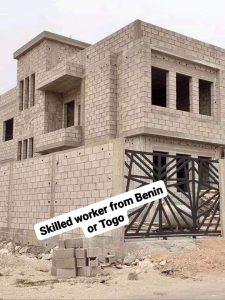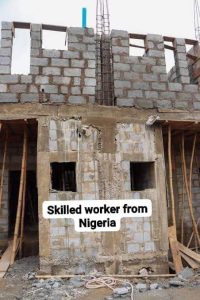In recent years, there’s been a growing interest in the skills and craftsmanship of workers from neighboring countries, Togo and Benin, compared to their counterparts in Nigeria.
.
This curiosity is rooted in the undeniable quality and precision of work seen in various images, showcasing impeccable finishing and settings in construction, woodworking, and other skilled trades.
.
**The Quest for Excellence:**
.
As we examine these striking images, it becomes clear that there is something extraordinary happening in these neighboring nations.
.
The finishing, the meticulous setting, and the overall quality are top-notch.
.
But it’s essential to clarify that this is not to discredit the talents and expertise of Nigerian builders.
.
Nigeria boasts its fair share of outstanding artisans and professionals.
.
However, what raises eyebrows is the contrast between the extraordinary work coming from Togo and Benin and the somewhat average standards in Nigeria.
.
**The Skills Exchange:**
.
It’s not merely about admiring the craftsmanship of our neighbors but also about reflecting on how Nigerian skilled workers can learn from and perhaps collaborate with their counterparts from Togo and Benin.
.
After all, learning and adapting are fundamental aspects of any profession.
**The Role of Vocational Training:**
.
One of the key factors that stand out in this skills divide is the role of vocational training.
.
Vocational training offers a structured and comprehensive path for individuals to develop their skills and expertise.
.
It equips them with the knowledge and tools needed to excel in their chosen fields.
.
From carpentry and masonry to mechanics and electricians, vocational training can significantly impact the quality of work produced.
.
One might wonder if Nigeria’s approach to vocational training needs improvement.
.
Does it begin early enough, perhaps in secondary schools?
.
Are there enough opportunities for young Nigerians to explore and develop their vocational skills?
.
These are questions that demand consideration and possibly a reevaluation of the educational and training systems in the country.
.
**The Import of Collaboration:**
.
However, the focus here should not be solely on the potential deficits within Nigeria’s vocational training system.
.
Instead, it’s an opportunity to collaborate, exchange knowledge, and encourage skills transfer between skilled workers in neighboring nations.
.
Nigerian professionals can benefit from exposure to new techniques, materials, and best practices.
.
The exchange of knowledge can be mutually beneficial, as it can also introduce Togolese and Beninese workers to unique aspects of the Nigerian construction and trade industries.
.
After all, collaboration and shared learning can elevate the skills and standards of an entire region.
.
**In Conclusion:**
.
In the pursuit of excellence, no country is an island.
.
Learning from our neighbors, such as the skilled workers from Togo and Benin, can be a catalyst for growth in Nigeria’s skilled trades and craftsmanship.
.
It’s not a matter of criticizing or downplaying local talent but an opportunity for improvement and progress.
.
By investing in vocational training, sharing knowledge, and embracing collaboration, the region can collectively enhance its skills and craftsmanship, ultimately contributing to the growth and development of Africa’s construction and trade industries.






